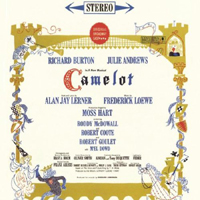 Original Broadway Cast, 1960 (Columbia/Sony)
Original Broadway Cast, 1960 (Columbia/Sony)  (5 / 5) Composition, performance, and audio technology all came together to make this a first-rate cast recording. Although Camelot is not as highly regarded as Lerner and Loewe’s masterpiece My Fair Lady, this album makes it sound like one of the best Broadway musicals of all time. Richard Burton in the role of King Arthur is at his absolute peak as a great stage actor, bringing extra substance to the character by virtue of his classical training. Surprisingly, Burton’s singing voice is rich and clear; he easily sails through the score, serving the Frederick Loewe melodies beautifully and delivering the witty and romantic Alan Jay Lerner lyrics as if they were the immortal words of the Bard himself. Julie Andrews is Guenevere, and her performances of such songs as “The Simple Joys of Maidenhood” and “I Loved You Once in Silence” are as good as anything she has ever recorded. To round out the perfect casting, Robert Goulet is Lancelot; when he introduced the great love song “If Ever I Would Leave You,” Goulet had one of the finest baritone voices ever heard on Broadway. Roddy McDowell and Robert Coote are also on hand for some star-power fun. The book of Camelot, based on the massive novel The Once and Future King, by T. H. White, has often been called unwieldy; but with the score isolated, the album is a gem. The songs are variously intricate, operatic, lyrical, charming, and delightfully funny. Meticulously conducted by Franz Allers, the orchestrations by Philip J. Lang and Robert Russell Bennett are a fine example of the best of those written during the golden age of Broadway musicals. By 1960, stereophonic recording on magnetic tape had been perfected and, even by today’s digital standards, this glorious score sounds magnificent here. Avid collectors may want to seek out the original vinyl LP edition; look for a laminated, blue-and-gold, gatefold album loaded with stunning color photos that give it a lavish storybook quality. You may even find that a copy of the LP in good condition sounds more expansive and warmer than subsequent compact discs editions of the recording. It’s a grand memento of the glamorous Kennedy era and a time when Broadway shows were the ultimate in entertainment. — Gerard Alessandrini
(5 / 5) Composition, performance, and audio technology all came together to make this a first-rate cast recording. Although Camelot is not as highly regarded as Lerner and Loewe’s masterpiece My Fair Lady, this album makes it sound like one of the best Broadway musicals of all time. Richard Burton in the role of King Arthur is at his absolute peak as a great stage actor, bringing extra substance to the character by virtue of his classical training. Surprisingly, Burton’s singing voice is rich and clear; he easily sails through the score, serving the Frederick Loewe melodies beautifully and delivering the witty and romantic Alan Jay Lerner lyrics as if they were the immortal words of the Bard himself. Julie Andrews is Guenevere, and her performances of such songs as “The Simple Joys of Maidenhood” and “I Loved You Once in Silence” are as good as anything she has ever recorded. To round out the perfect casting, Robert Goulet is Lancelot; when he introduced the great love song “If Ever I Would Leave You,” Goulet had one of the finest baritone voices ever heard on Broadway. Roddy McDowell and Robert Coote are also on hand for some star-power fun. The book of Camelot, based on the massive novel The Once and Future King, by T. H. White, has often been called unwieldy; but with the score isolated, the album is a gem. The songs are variously intricate, operatic, lyrical, charming, and delightfully funny. Meticulously conducted by Franz Allers, the orchestrations by Philip J. Lang and Robert Russell Bennett are a fine example of the best of those written during the golden age of Broadway musicals. By 1960, stereophonic recording on magnetic tape had been perfected and, even by today’s digital standards, this glorious score sounds magnificent here. Avid collectors may want to seek out the original vinyl LP edition; look for a laminated, blue-and-gold, gatefold album loaded with stunning color photos that give it a lavish storybook quality. You may even find that a copy of the LP in good condition sounds more expansive and warmer than subsequent compact discs editions of the recording. It’s a grand memento of the glamorous Kennedy era and a time when Broadway shows were the ultimate in entertainment. — Gerard Alessandrini
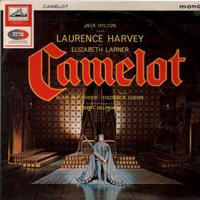 Original London Cast, 1964 (First Night/no CD)
Original London Cast, 1964 (First Night/no CD)  (2 / 5) This recording lacks the fine musicality of the original Broadway cast album. In the role of King Arthur, Laurence Harvey displays a resonant voice, and his classical training and romantic appeal are evident. What’s missing is a melodic lilt to his voice, and, unlike Richard Burton, Harvey cannot sustain notes; the tempi of many of his songs are too fast, presumably in deference to his vocal limitations. His Guenevere, Elizabeth Larner, has a beautiful voice and delivers her songs very appealingly, but in her case and that of Barry Kent as Lancelot, listeners may feel as if they’re hearing standbys for the absent stars Julie Andrews and Robert Goulet. Among the other soloists heard on the recording are Nicky Henson as Mordred and Josephine Gordon as Nimue. The album does include a recording of “The Joust,” which is not on the Broadway album. If only for that reason, it may be of interest to collectors. — G.A.
(2 / 5) This recording lacks the fine musicality of the original Broadway cast album. In the role of King Arthur, Laurence Harvey displays a resonant voice, and his classical training and romantic appeal are evident. What’s missing is a melodic lilt to his voice, and, unlike Richard Burton, Harvey cannot sustain notes; the tempi of many of his songs are too fast, presumably in deference to his vocal limitations. His Guenevere, Elizabeth Larner, has a beautiful voice and delivers her songs very appealingly, but in her case and that of Barry Kent as Lancelot, listeners may feel as if they’re hearing standbys for the absent stars Julie Andrews and Robert Goulet. Among the other soloists heard on the recording are Nicky Henson as Mordred and Josephine Gordon as Nimue. The album does include a recording of “The Joust,” which is not on the Broadway album. If only for that reason, it may be of interest to collectors. — G.A.
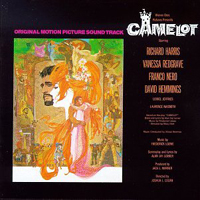 Film Soundtrack, 1967 (Warner Bros)
Film Soundtrack, 1967 (Warner Bros)  (3 / 5) Wonderful orchestrations almost elevate this Hollywood version of the enduring Broadway hit into the category of great recorded music — but not quite. The team of Alfred Newman (conductor), Ken Darby (choral arrangements), and Edward Powell (orchestrations) gave the Lerner-Loewe songs the royal treatment, but uneven vocal performances keep this album from equaling the Broadway recording as a fully satisfying performance of the score. Although Vanessa Redgrave does a fine acting job in the film as Guenevere, her singing is barely adequate; she does her best to “act” her way through songs written for the voice of Julie Andrews, but she seems to be trying too hard for effect. As a result, Redgrave sounds campy in many of her musical moments. Richard Harris is a better singer with a greater range, but his acting is overwrought and forced in the role of King Arthur. Gene Merlino, dubbing Lancelot’s songs for Franco Nero, fares better. Fans of this durable score may delight in the magnificent arrangements of the overture and choral selections such as “Follow Me.” If Warner ever decides to issue a more complete version of the soundtrack album, including the Korngold-like treatment of Loewe’s background score, that would be a must-have item. As it is, this edition is disappointing. — G.A.
(3 / 5) Wonderful orchestrations almost elevate this Hollywood version of the enduring Broadway hit into the category of great recorded music — but not quite. The team of Alfred Newman (conductor), Ken Darby (choral arrangements), and Edward Powell (orchestrations) gave the Lerner-Loewe songs the royal treatment, but uneven vocal performances keep this album from equaling the Broadway recording as a fully satisfying performance of the score. Although Vanessa Redgrave does a fine acting job in the film as Guenevere, her singing is barely adequate; she does her best to “act” her way through songs written for the voice of Julie Andrews, but she seems to be trying too hard for effect. As a result, Redgrave sounds campy in many of her musical moments. Richard Harris is a better singer with a greater range, but his acting is overwrought and forced in the role of King Arthur. Gene Merlino, dubbing Lancelot’s songs for Franco Nero, fares better. Fans of this durable score may delight in the magnificent arrangements of the overture and choral selections such as “Follow Me.” If Warner ever decides to issue a more complete version of the soundtrack album, including the Korngold-like treatment of Loewe’s background score, that would be a must-have item. As it is, this edition is disappointing. — G.A.
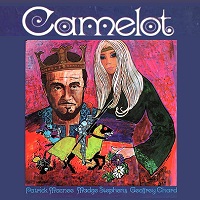 Studio Cast, 1968 (World Record Club) No stars; not recommended. This horror should never have been released, and one has to wonder if Lerner and/or Loewe considered pursuing a cease and desist order to have it withdrawn from the catalogue immediately. The chief villain here, in the role of King Arthur, is Patrick Macnee, who was famous at the time as one of the stars of the TV series The Avengers but who, on the basis of this recording, should never have come within 1000 miles of musical theater in a performance capacity. Not only does Macnee make no effort to sing the melodies of Arthur’s songs at any point during the proceedings, neither is he able to recite the lyrics in time to the music, constantly rushing ahead and thereby causing one train wreck after another. Madge Stephens as Guenevere displays a pretty soprano voice but makes many unfortunate choices in terms of phrasing and interpretation. And though Geoffrey Chard possesses a strong baritone, his renditions of Lancelot’s songs are done in by the stodginess of his singing and by rolled “r”s that make him sound like a refugee from an operetta or one of those hopelessly dated film musicals of the early 1930s. In addition to “C’est moi” and “If Ever I Would Leave You,” Chard has been handed Nimue’s beautiful song “Follow Me,” no doubt as a way for the record producers to avoid paying another salary; Macnee, Stephens, and Chard are the only three singers heard here, no Mordred or knight soloists or chorus to be found, leading to the excision of the songs “Fie on Goodness,” “Guenevere,” and “The Seven Deadly Virtues.” Capping the album is a weird “Finale” cut that sounds like an edited repeat of part of the “Overture” track, with no contribution at all from Macnee – a small mercy, under the circumstances. The new orchestrations are not terrible but certainly are not a patch on the originals. (Some of them call to mind the orchestral charts for the film version of Camelot, which was released about one year earlier.) In sum, this album is an extremely dispiriting affair. — Michael Portantiere
Studio Cast, 1968 (World Record Club) No stars; not recommended. This horror should never have been released, and one has to wonder if Lerner and/or Loewe considered pursuing a cease and desist order to have it withdrawn from the catalogue immediately. The chief villain here, in the role of King Arthur, is Patrick Macnee, who was famous at the time as one of the stars of the TV series The Avengers but who, on the basis of this recording, should never have come within 1000 miles of musical theater in a performance capacity. Not only does Macnee make no effort to sing the melodies of Arthur’s songs at any point during the proceedings, neither is he able to recite the lyrics in time to the music, constantly rushing ahead and thereby causing one train wreck after another. Madge Stephens as Guenevere displays a pretty soprano voice but makes many unfortunate choices in terms of phrasing and interpretation. And though Geoffrey Chard possesses a strong baritone, his renditions of Lancelot’s songs are done in by the stodginess of his singing and by rolled “r”s that make him sound like a refugee from an operetta or one of those hopelessly dated film musicals of the early 1930s. In addition to “C’est moi” and “If Ever I Would Leave You,” Chard has been handed Nimue’s beautiful song “Follow Me,” no doubt as a way for the record producers to avoid paying another salary; Macnee, Stephens, and Chard are the only three singers heard here, no Mordred or knight soloists or chorus to be found, leading to the excision of the songs “Fie on Goodness,” “Guenevere,” and “The Seven Deadly Virtues.” Capping the album is a weird “Finale” cut that sounds like an edited repeat of part of the “Overture” track, with no contribution at all from Macnee – a small mercy, under the circumstances. The new orchestrations are not terrible but certainly are not a patch on the originals. (Some of them call to mind the orchestral charts for the film version of Camelot, which was released about one year earlier.) In sum, this album is an extremely dispiriting affair. — Michael Portantiere
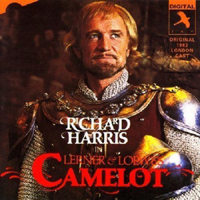 London Cast, 1982 (Varese Sarabande)
London Cast, 1982 (Varese Sarabande)  (1 / 5) Richard Harris, who starred as King Arthur in the movie of Camelot, toured extensively in the role. By the time he recorded this London cast album, his performance was as petrified as aged wood, and anything that was good about his characterization in the film had been obliterated. The concept of the Lerner-Loewe musical was to portray King Arthur as a young, vibrant leader, not a stodgy old monarch. When Harris made the film, he was an attractive, sexually vital, youngish actor; when he returned to the part on tour years later, his age completely subverted the story. In this recording, Harris rasps his way through the jaunty title song and delivers an over-the-top performance more appropriate to the dusty old Shakespearean actor in The Fantasticks. By the end of the album, he is indulging in vocal histrionics that are ludicrous. Fiona Fullerton as Guenevere sounds quite lovely, but Robert Meadmore as Lancelot is no baritone; his voice has a bleating, high-tenor timbre that’s jarring. All in all, this recording is of little value except as one of the most unintentionally comedic cast albums of all time. Ultimately, Harris himself chisels its epitaph when, at the end, he screams insanely: “R-U-U-N-N, BOY! R-U-U-U-N-N-N!!!!” — G.A.
(1 / 5) Richard Harris, who starred as King Arthur in the movie of Camelot, toured extensively in the role. By the time he recorded this London cast album, his performance was as petrified as aged wood, and anything that was good about his characterization in the film had been obliterated. The concept of the Lerner-Loewe musical was to portray King Arthur as a young, vibrant leader, not a stodgy old monarch. When Harris made the film, he was an attractive, sexually vital, youngish actor; when he returned to the part on tour years later, his age completely subverted the story. In this recording, Harris rasps his way through the jaunty title song and delivers an over-the-top performance more appropriate to the dusty old Shakespearean actor in The Fantasticks. By the end of the album, he is indulging in vocal histrionics that are ludicrous. Fiona Fullerton as Guenevere sounds quite lovely, but Robert Meadmore as Lancelot is no baritone; his voice has a bleating, high-tenor timbre that’s jarring. All in all, this recording is of little value except as one of the most unintentionally comedic cast albums of all time. Ultimately, Harris himself chisels its epitaph when, at the end, he screams insanely: “R-U-U-N-N, BOY! R-U-U-U-N-N-N!!!!” — G.A.
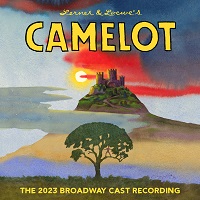 Broadway Cast, 2023 (Broadway Records)
Broadway Cast, 2023 (Broadway Records)  (1 / 5) This cast album is somewhat more enjoyable in its own right than the production that yielded it, which was a near-complete misfire — primarily due to the bizarre direction of Bartlett Sher and the too-clever-by-half, aggressively post-modern rewrite of Alan Jay Lerner’s book that Aaron Sorkin crafted for this show, which many consider a classic despite its flaws as originally written and conceived. Nor are the performances of the leads of this Lincoln Center Theater revisal good enough to compensate. Following an unexciting reading of the overture led by musical director/conductor Kimberly Grigsby, Andrew Burnap’s King Arthur comes across in both “I Wonder What the King is Doing Tonight” and the title song as a sweet but rather bland young guy of the type you might find in a Hallmark holiday TV movie. Phillipa Soo as Guenevere does an overall fine job with “The Simple Joys of Maidenhood,” and having her sing this song to Arthur, rather than to the audience as a musical monologue, was one of the few good ideas in this production. Jordan Donica’s virile baritone makes a strong first impression with “C’est Moi,” and Soo and company give us an enjoyable run-through of “The Lusty Month of May” — except for an annoying slow-down at the extended “tra-la” section. “Take Me to the Fair,” in which Guenevere responds so negatively to Lancelot’s personality upon their first meeting that she goads three of the knights to seriously injure or even kill him in the jousts, is done well enough, but this huge blot on the score should have remained forever cut from Camelot (as it was during the run of the original production). Burnap offers an ineffective performance of a severely truncated version of “How Handle a Woman,” and while Donica’s “If Ever I Would Leave You” is delivered with gorgeous sound, this classic Broadway love song is self-indulgently overacted here, damaged further by the singer’s questionable phrasing choices at the slow tempo set by the conductor. Taylor Tresnch as Mordred gives a pointed-enough rendition of “The Seven Deadly Virtues,” which is followed by one of the most disconcerting tracks on this recording: “What Do the Simple Folk Do?,” sunk by a lack of wit, charm, and chemistry in the performances of Burnap and Soo, not to mention the addition of some groan-inducing Sorkin dialogue. (At least the full ending of “Simple Folk” is heard on this recording; incredibly, it was cut from the production itself, thereby nullifying the entire point of the song.) Most of the solo voices in “Fie on Goodness” are not quite adequate — and fie on whoever is responsible for instructing or allowing the “How we roared and brawled in Scotland” soloist to grandstand by holding a high note beyond all reasonable measure. The decision to take “I Loved You Once in Silence” away from Guenevere and hand it to Lancelot might have seemed better justified if Donica hadn’t chosen to over-inflect this song as a syrupy pop ballad. “Guenevere” is fairly exciting here at a brisk tempo, peppered with new dialogue that’s not half bad, but Burnap’s performance of the final scene is as weak as one might have expected, given what has come before it. All in all, this cast album is an unnecessary and unsatisfying addition to the discography. – M.P.
(1 / 5) This cast album is somewhat more enjoyable in its own right than the production that yielded it, which was a near-complete misfire — primarily due to the bizarre direction of Bartlett Sher and the too-clever-by-half, aggressively post-modern rewrite of Alan Jay Lerner’s book that Aaron Sorkin crafted for this show, which many consider a classic despite its flaws as originally written and conceived. Nor are the performances of the leads of this Lincoln Center Theater revisal good enough to compensate. Following an unexciting reading of the overture led by musical director/conductor Kimberly Grigsby, Andrew Burnap’s King Arthur comes across in both “I Wonder What the King is Doing Tonight” and the title song as a sweet but rather bland young guy of the type you might find in a Hallmark holiday TV movie. Phillipa Soo as Guenevere does an overall fine job with “The Simple Joys of Maidenhood,” and having her sing this song to Arthur, rather than to the audience as a musical monologue, was one of the few good ideas in this production. Jordan Donica’s virile baritone makes a strong first impression with “C’est Moi,” and Soo and company give us an enjoyable run-through of “The Lusty Month of May” — except for an annoying slow-down at the extended “tra-la” section. “Take Me to the Fair,” in which Guenevere responds so negatively to Lancelot’s personality upon their first meeting that she goads three of the knights to seriously injure or even kill him in the jousts, is done well enough, but this huge blot on the score should have remained forever cut from Camelot (as it was during the run of the original production). Burnap offers an ineffective performance of a severely truncated version of “How Handle a Woman,” and while Donica’s “If Ever I Would Leave You” is delivered with gorgeous sound, this classic Broadway love song is self-indulgently overacted here, damaged further by the singer’s questionable phrasing choices at the slow tempo set by the conductor. Taylor Tresnch as Mordred gives a pointed-enough rendition of “The Seven Deadly Virtues,” which is followed by one of the most disconcerting tracks on this recording: “What Do the Simple Folk Do?,” sunk by a lack of wit, charm, and chemistry in the performances of Burnap and Soo, not to mention the addition of some groan-inducing Sorkin dialogue. (At least the full ending of “Simple Folk” is heard on this recording; incredibly, it was cut from the production itself, thereby nullifying the entire point of the song.) Most of the solo voices in “Fie on Goodness” are not quite adequate — and fie on whoever is responsible for instructing or allowing the “How we roared and brawled in Scotland” soloist to grandstand by holding a high note beyond all reasonable measure. The decision to take “I Loved You Once in Silence” away from Guenevere and hand it to Lancelot might have seemed better justified if Donica hadn’t chosen to over-inflect this song as a syrupy pop ballad. “Guenevere” is fairly exciting here at a brisk tempo, peppered with new dialogue that’s not half bad, but Burnap’s performance of the final scene is as weak as one might have expected, given what has come before it. All in all, this cast album is an unnecessary and unsatisfying addition to the discography. – M.P.

